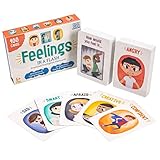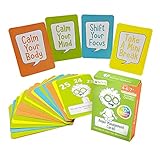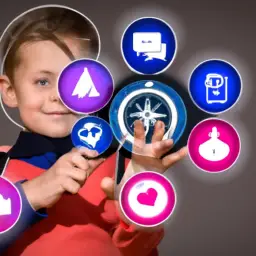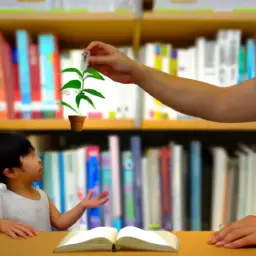Do you want to help your child develop emotional intelligence and grit? Mindfulness exercises can be a powerful tool. By practicing mindfulness, children learn to focus their attention, regulate their emotions, and develop resilience.
In this article, you will learn eleven effective mindfulness exercises that can help your child enhance their emotional intelligence and grit.
Science has shown that mindfulness can have a positive impact on children’s mental health and well-being. It can help reduce stress and anxiety, improve concentration, and increase self-awareness and empathy.
By incorporating mindfulness into your child’s daily routine, you can help them develop the skills they need to navigate life’s challenges with greater ease and resilience. So, whether your child struggles with managing their emotions or simply needs a little extra support in developing their emotional intelligence and grit, these mindfulness exercises can help.
Key Takeaways
- Mindfulness exercises can help children develop emotional intelligence and grit, improve mental health and well-being, reduce stress and anxiety, and increase self-awareness and empathy.
- Incorporating mindfulness exercises into daily routines can also enhance academic performance, attention, memory, and cognitive flexibility, as well as improve emotional regulation and reduce symptoms of anxiety and depression.
- Mindfulness exercises for children include mindful breathing, movement (such as yoga poses and stretching), visualization, sensory awareness, and mindful listening.
- Deep breathing before starting tasks, mindful eating, and bedtime routines with relaxation techniques are also effective mindfulness exercises for children. Practicing mindfulness can help children navigate life’s challenges with greater ease and resilience, and improve their overall well-being.
The Benefits of Mindfulness for Children
Let’s explore the awesome perks that mindfulness can bring to kids, from enhancing emotional intelligence to boosting grit!
One of the most significant benefits of practicing mindfulness is its positive impact on academic performance. Studies have shown that children who practice mindfulness regularly perform better in school, with improvements in attention, memory, and cognitive flexibility.
Mindfulness also helps to reduce anxiety in children, which can be a significant obstacle to academic success. By teaching children to focus on their breathing and observe their thoughts without judgment, mindfulness helps them to manage their emotions and reduce stress levels, leading to improved academic performance.
In addition to its benefits for academic performance, mindfulness is also a powerful tool for reducing anxiety in children. Anxiety is a common problem among kids, and it can manifest in a variety of ways, from social withdrawal to physical symptoms like headaches and stomachaches.
Mindfulness helps children to develop greater self-awareness and to identify the physical and emotional sensations associated with anxiety. By learning to observe these sensations without judgment, children can develop greater resilience and learn to manage their anxiety more effectively.
By incorporating mindfulness into their daily routines, parents and caregivers can help children build the skills they need to thrive in both academic and social settings.
The Science Behind Mindfulness
You’ll be interested to know that there’s scientific evidence supporting the effectiveness of mindfulness.
Studies have shown that mindfulness can lead to changes in the brain, particularly in the areas associated with emotional regulation and attention.
Additionally, mindfulness has been linked to the development of grit. This is the ability to persevere through challenges and setbacks.
Brain Changes Associated with Mindfulness
When practicing mindfulness, your brain undergoes changes that are associated with improved emotional intelligence and grit. This is due to the neuroplasticity implications of mindfulness, which means that your brain has the ability to change and adapt to new experiences.
When you practice mindfulness regularly, it can lead to structural and functional changes in your brain that support emotional regulation, empathy, and resilience.
Here are three brain changes that occur with mindfulness practice:
-
Increased gray matter in the prefrontal cortex, which is responsible for decision-making, attention, and self-awareness.
-
Reduced activity in the amygdala, which is the part of the brain responsible for the fight-or-flight response and fear-based emotions.
-
Strengthened connections between the prefrontal cortex and the amygdala, which supports better emotional regulation and response flexibility.
By understanding the neuroplasticity implications of mindfulness and its effect on brain function, we can see how it can lead to increased emotional intelligence and grit in children. These skills can help children navigate challenges and build resilience in the face of adversity.
The Role of Mindfulness in Emotional Regulation
Practicing mindfulness regularly can lead to significant improvements in regulating your emotions, thanks to its ability to change the brain’s structure and function. This is especially important in education, where children are often faced with challenging situations that may trigger negative emotions. By teaching mindfulness and incorporating mindfulness-based stress reduction techniques for children, educators can help them learn how to manage their emotions more effectively and improve their overall well-being.
In fact, research has shown that mindfulness can have a positive impact on emotional regulation and reduce symptoms of anxiety and depression in children. According to a study published in the Journal of Applied School Psychology, students who participated in a mindfulness-based stress reduction program showed significant improvements in emotional regulation, stress management, and overall well-being compared to those who did not participate. By incorporating mindfulness practices into the classroom, educators can help children develop the skills they need to manage their emotions and thrive academically and socially.
| Mindfulness and Emotional Regulation in Education | Mindfulness-Based Stress Reduction Techniques for Children | |||
|---|---|---|---|---|
| Helps children manage emotions more effectively | Reduces symptoms of anxiety and depression | |||
| Improves overall well-being | Teaches children stress management skills | |||
| Enhances academic and social success | Promotes mindfulness as a lifelong practice | |||
| Can be taught in the classroom | Can be beneficial for children with emotional disorders | Helps develop self-awareness and empathy | Provides a safe and supportive environment for children to express themselves |
The Connection Between Mindfulness and Grit
Discover how mindfulness and grit are interconnected and can lead to greater success in achieving your goals. Mindfulness and resilience go hand in hand, as the practice of mindfulness helps individuals develop a greater sense of self-awareness and emotional regulation. By being aware of their thoughts and emotions, children can learn to manage them effectively, leading to greater resilience and the ability to bounce back from setbacks.
Teaching grit through mindfulness involves helping children develop a growth mindset, where they view challenges as opportunities for growth and learning. Mindfulness practices such as meditation and breathwork can help children develop the focus and mental clarity needed to persevere through challenges.
Additionally, incorporating mindfulness into daily routines and activities can help children develop a sense of purpose and direction, which can lead to greater motivation and goal setting. By practicing mindfulness and developing grit, children can cultivate the skills and mindset needed to achieve success in all areas of their lives.
Learn how mindfulness can help you develop resilience and emotional regulation.
Discover the connection between mindfulness and developing a growth mindset.
Explore how mindfulness practices such as meditation and breathwork can help you persevere through challenges.
Find out how incorporating mindfulness into your daily routine can help you develop a sense of purpose and direction.
Mindful Breathing Exercises
Try incorporating mindful breathing exercises into your child’s daily routine to improve their emotional intelligence and grit. Breathing techniques are a fundamental aspect of mindfulness, and they can help your child develop a strong sense of mindful awareness.
Mindful breathing exercises can help your child learn how to focus their attention on their breath, which can help them develop their emotional regulation skills. To start, encourage your child to sit in a comfortable position and breathe in through their nose and out through their mouth. Ask them to focus on the sensation of their breath as it enters and leaves their body.
If their mind wanders, gently guide them back to their breath. With practice, your child will learn how to use their breath as a tool to manage their emotions and build their resilience.
By incorporating mindful breathing exercises into your child’s daily routine, you can help them develop the skills they need to thrive in today’s fast-paced world.
Mindful Movement Exercises
Incorporating mindful movement into your daily routine can significantly improve your physical and mental wellbeing. Here are three simple yet effective mindful movement exercises you can try with your child:
-
Creative visualization: Ask your child to close their eyes and imagine themselves as a tree. They can visualize their roots growing deep into the ground, their trunk strong and sturdy, and their branches reaching up towards the sky. This exercise helps to promote a sense of grounding and stability.
-
Sensory awareness: Encourage your child to pay attention to their senses as they move their body. For example, they can focus on the feeling of their feet touching the ground as they walk, or the sensation of the wind on their skin as they run. This exercise helps to cultivate mindfulness and present moment awareness.
-
Yoga poses: Simple yoga poses such as downward dog, child’s pose, and tree pose can be a great way to incorporate mindful movement into your child’s daily routine. These poses help to improve flexibility, strength, and balance, while also promoting relaxation and mindfulness.
Mindful Listening Exercises
Listen up! You can improve your listening skills and deepen your connection with your child through these mindful listening exercises.
First, try playing interactive games that require active listening. For example, you can play a game where you take turns describing an object, and the other person has to guess what it is based on your description. This encourages your child to really listen to what you’re saying and actively engage in the conversation.
Another mindful listening exercise is mindful drawing. Sit down with your child and take turns drawing something while the other person describes it. The person who’s drawing must really listen to the description and try to capture it on paper.
This exercise not only improves listening skills, but it also encourages creativity and focus. By practicing mindful listening exercises with your child, you can strengthen your emotional connection and help them develop valuable skills that’ll benefit them in all areas of life.
Tips for Incorporating Mindfulness into Daily Routines
One simple way to add mindfulness to your daily routine is by taking a few deep breaths before starting any task. This can help you center yourself and focus on the present moment, instead of getting caught up in future worries or past regrets. You can also incorporate mindfulness into other daily routines, such as mindful eating and bedtime routines.
When it comes to mindful eating, try to be present and fully engaged with the food you’re consuming. This means slowing down and noticing the taste, texture, and smell of each bite, rather than mindlessly shoveling food into your mouth. As for bedtime routines, you can try incorporating relaxation techniques such as deep breathing or meditation to help calm your mind and prepare for a restful night’s sleep. By incorporating mindfulness into your daily routines, you can enhance your emotional intelligence and grit, and improve your overall well-being.
| Mindful Eating | Bedtime Routines |
|---|---|
| Slow down and savor each bite | Practice relaxation techniques |
| Be present and fully engaged with the food | Calm your mind before sleep |
| Notice the taste, texture, and smell of each bite | Prepare for a restful night’s sleep |
| Avoid mindless eating | Incorporate mindfulness into your bedtime routine |
| Enhance your overall well-being | Improve your emotional intelligence and grit |
Frequently Asked Questions
What is the ideal age to start practicing mindfulness exercises with children?
You may be wondering what the ideal age is to start practicing mindfulness exercises with children. Well, research has shown that there are benefits of early mindfulness, as it can help children develop emotional intelligence and grit. However, it can also be challenging to introduce mindfulness to young children, as their attention span may be limited and they may not fully understand the concept.
It’s recommended to start with short, simple mindfulness exercises and gradually increase the duration and complexity as the child grows and develops. Ultimately, it’s important to find a balance and approach that works best for each individual child.
Can mindfulness exercises replace traditional discipline methods?
Mindfulness exercises can be a helpful addition to traditional discipline methods, but it’s important to understand the benefits and drawbacks.
While mindfulness can help children manage their emotions and behavior, it may not always be effective in addressing specific behavioral issues.
Additionally, relying solely on mindfulness exercises to discipline children may not be enough, as it’s important to also set clear boundaries and consequences for negative behavior.
Therefore, incorporating mindfulness exercises alongside other discipline methods can be a helpful approach to promoting emotional intelligence and grit in children.
How long should each mindfulness exercise session last for children?
When it comes to practicing mindfulness exercises with children, it’s important to keep in mind that shorter sessions may actually be more beneficial. While it may be tempting to try and have longer sessions to maximize the benefits, shorter sessions allow for more frequent practice throughout the day.
Incorporating mindfulness into daily routines, such as taking a few minutes to practice deep breathing before bedtime or during transitions between activities, can be a great way to make sure children are getting the most out of their mindfulness practice.
By practicing mindfulness in shorter sessions throughout the day, children can build their emotional intelligence and grit over time, leading to long-term benefits.
Are there any mindfulness exercises that should be avoided for children with ADHD or other attention-related disorders?
When it comes to mindfulness exercises for children with attention disorders, there are potential risks that need to be considered. Some exercises may require sustained attention or may be too overwhelming for children with ADHD or other attention-related disorders.
Modification strategies can include shortening the duration of the exercise, providing visual aids or other sensory accommodations, and allowing for breaks or movement. Alternative strategies for improving emotional intelligence and grit in children with attention disorders can include mindfulness-based activities that incorporate movement, such as yoga or tai chi, or sensory-based practices such as deep breathing or progressive muscle relaxation.
It’s important to work with a qualified healthcare provider or mindfulness instructor to determine the best approach for each individual child.
How can parents and teachers measure the progress of children’s emotional intelligence and grit through mindfulness exercises?
To measure the progress of your child’s emotional intelligence and grit through mindfulness exercises, there are a few options.
Self-evaluation can be a great starting point, as the child can reflect on their own emotional state before and after practicing mindfulness techniques such as breathing exercises or body scans.
However, it’s also important to have the input of a teacher or other trusted adult, who can observe changes in behavior and emotional regulation over time.
By combining self-reflection and teacher evaluation, you can gain a better understanding of how mindfulness is benefiting your child’s emotional well-being and overall resilience.
Conclusion
So there you have it! By incorporating mindfulness exercises into your child’s daily routine, you can help them develop emotional intelligence and grit.
These skills will serve them well throughout their lives, helping them to navigate challenges and build resilience.
Remember that mindfulness is a practice, and it takes time to develop. Start with simple exercises like mindful breathing and gradually work your way up to more complex activities.
With consistent practice, you’ll start to see the positive effects of mindfulness in your child’s behavior and emotional well-being. So why not give it a try today? Your child’ll thank you for it!

















































































































